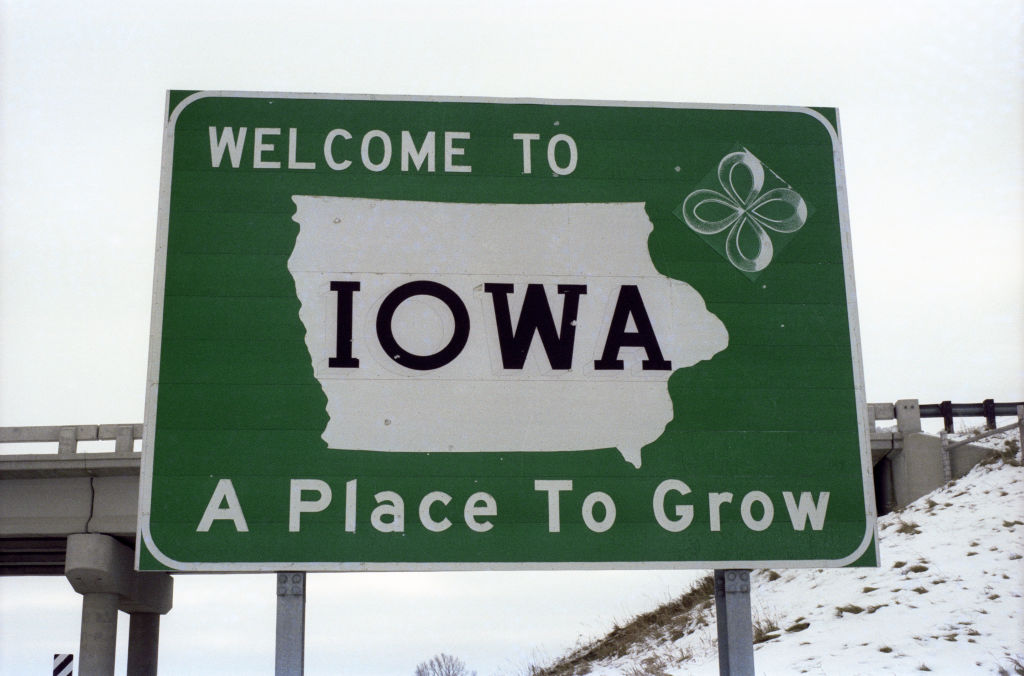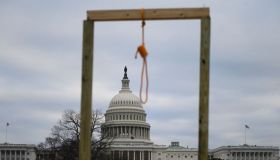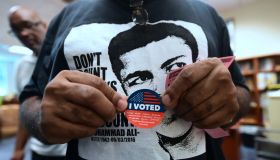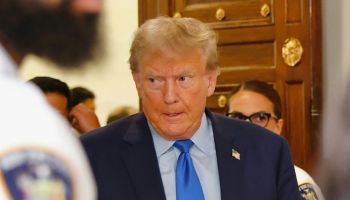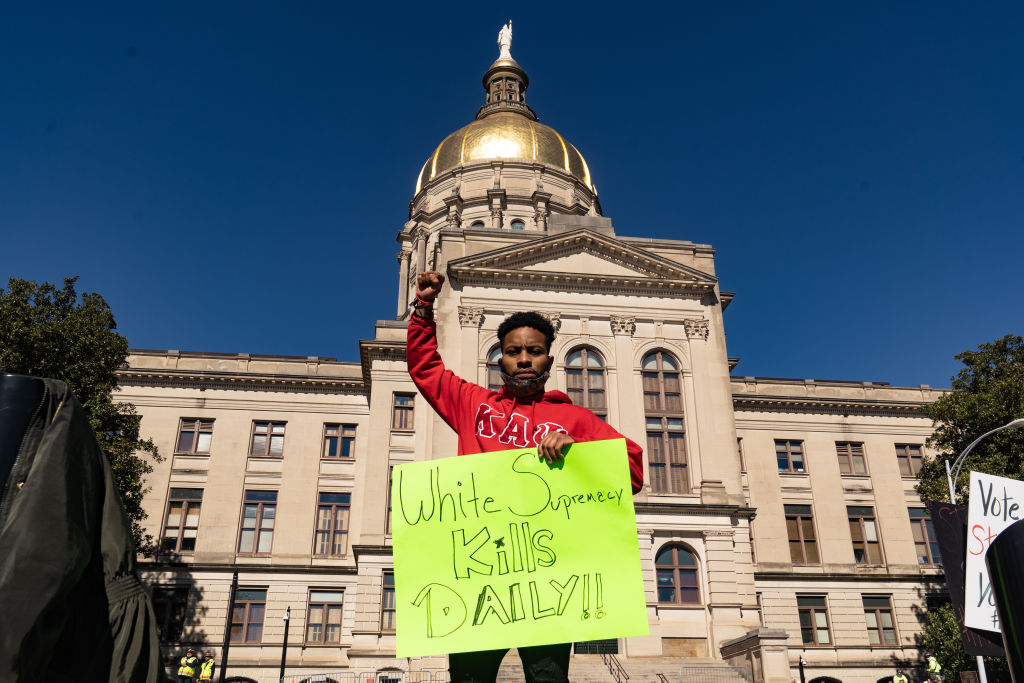
Source: Megan Varner / Getty
Formed and fueled in the depths of “the big lie” that former President Donald Trump was the victim of election fraud, Georgia’s new voting law SB 202 seeks to undo procedural safeguards and implements additional barriers to ballot access.
Several provisions in the new law limit voter participation by requiring those voting by absentee ballot to submit a copy of their ID, reduces the locations and use of secure drop boxes, prohibits the use of mobile voting to ease long lines and allows for state takeover of local boards of election.
Cliff Albright, the co-founder of Black Voters Matter Fund, said the most troubling parts of SB 202 are the provisions diluting Georgia’s secretary of state’s power and allowing local county boards to take over an election.
“That’s the failsafe,” said Albright, referring to the state takeover provision. “If all the other tools they got in the toolbox fail…then they could just come in and do exactly what Trump wanted them to do.”
Albright referenced the leaked conversation between Trump and Georgia Secretary of State Brad Raffensperger, where the then-president directed him to go find him more votes.
SB 202 removes the secretary of state as Georgia’s election board’s chair, allowing the Republican-controlled state legislature to appoint its leader. The legislature already appointed two members of the five-person board.
“We’re in a crisis with that passing here in Georgia,” said former State Rep. Simone Bell. “If you look at what this bill does, it seems to give republicans the right to overthrow an election if they don’t agree with it, or if they can come up with some reason, some board of election didn’t do something properly.”
State Republicans have regularly targeted Fulton County, home to most of the city of Atlanta and a large portion of Georgia’s Black voters. During the multiple rounds of vote-counting after the 2020 election, unfounded claims of fraud targeted Fulton County voters. Opponents say that having a state-controlled body potentially act on false claims with no oversight or transparency is alarming.
Attorney and Georgia elections expert Sara Tindall Ghazal called the bill “a dangerous anti-majoritarian move [that] concentrates power in a handful of individuals all appointed by the General Assembly with virtually no oversight or accountability.”
Likewise, Albright pointed to the new provision allowing unlimited voter challenges. He said he sees this expansion as a direct response to the attempt of the conservative organization True the Vote, which funded a challenge against thousands of Georgia voters ahead of the state’s Senate runoff in January.
“They really set a framework so they could just challenge whatever Black voters they want,” Albright said.
The Texas-based True the Vote partnered with local Republicans to challenge the residency of nearly 350,000 Georgia voters. Several county boards of election threw out the challenges. The group did not hide its relationship with the Georgia GOP, raising questions about its 501(c)(3) status.
District Court Judge Leslie Abrams Gardner — sister of Stacey Abrams — shot down attempts to block approximately 4,000 voters in two Georgia counties. Feeling the heat from his party, Raffensperger blasted the decision siding with the out-of-state group seeking to prevent ballots from being cast.
James Woodall, president of the Georgia NAACP, highlighted on Twitter other restrictive aspects of the bill, including the reduced time to request and return absentee ballots.
Republicans claimed this provision was to ensure ballots were received on time. But they refused to consider extending the received by date as other states have done. Several states permit an absentee ballot to be counted if it is received a certain number of days after the election, so long as it was postmarked by Election Day.
Woodall also noted the requirement to submit a copy of the ID for those without a driver’s license could pose an additional burden on some incarcerated people who keep the right to vote.
The law also shortened the time for a runoff election from nine weeks to four. It’s unclear what impact the shortened process would have on those choosing to vote by absentee ballot.
Furthermore, Republicans established a fraud hotline in the attorney general’s office, fueling the unfounded notion that fraud is a valid concern in Georgia’s elections.
SB 202 also prohibits the practice of line-warming, where volunteers often provide comfort to voters waiting in line. During the 2020 general election, some volunteers were met with resistance at various poll locations around the state and were told they could not be within 150 feet of the polling location — the standard for electioneering or activity by a political party or candidate.
Many organizations that do line-warming are nonpartisan nonprofit organizations that provide food, drinks, rain ponchos and even hand warmers to anyone near a polling location. Under SB 202, people cannot provide such supports within 150 feet of a polling location. This effectively treats non-partisan nonprofit volunteer efforts the same as partisan activity.
Black Voters Matter and the New Georgia Project sued almost immediately after Gov. Brian Kemp signed SB 202 into law Thursday night behind closed doors.
“There’s no acceptable version of this bill partially because the entire premise is a lie,” Albright explained.
As the legal strategy moves forward, Albright said it is still important to press companies that previously funded voter suppression.
“[One thing] that was most frustrating about these companies in the chamber, and their statements, even as they were trying to pretend like they were supporting voters, their very statements gave legitimacy to the big lie,” Albright exclaimed. “Every one of those statements talks about the security of our elections; we need to balance access and security…we need to have a balanced approach. What are you balancing? There’s no fraud.”
Albright sees the corporate accountability campaign continuing as a pressure point to get support around laws at the federal level.
“I think what there’s consensus on is, and especially now with [SB 202] being signed; it’s not just about getting them to be accountable to Georgia law, it’s about getting all of them to get involved in this larger voting rights fight, which is HR-1 and HR-4,” Albright said.
Looking forward, State Rep. Bell says Georgia is in a crisis, but there is also a firm foundation to do the organizing and mobilizing to maintain gains and win more.
“We need to continue to get more voters into the process and registered, and we need to continue to do the voter education, so folks know what they’re actually voting for,” said Bell. “As a state, we are in probably one of the best positions we’ve been in. And we need to continue to build all of that.”
Anoa Changa is a movement journalist and retired attorney based in Atlanta, Georgia. Follow Anoa on Instagram and Twitter @thewaywithanoa.
SEE ALSO:
Police Forcibly Arrest Black Woman Legislator For Opposing Georgia’s New Voter Suppression Laws
Georgia’s Voter Suppression Bill Signed Into Law While Slave Plantation Painting Hangs In Background
